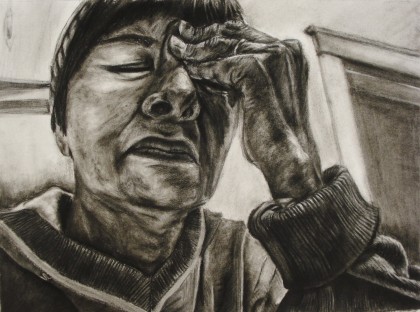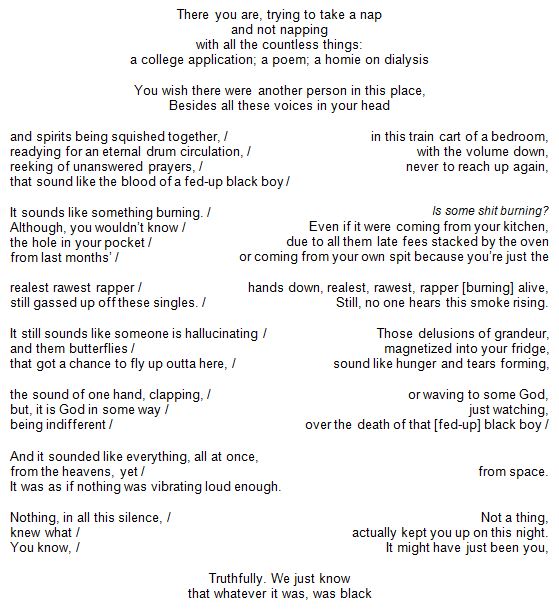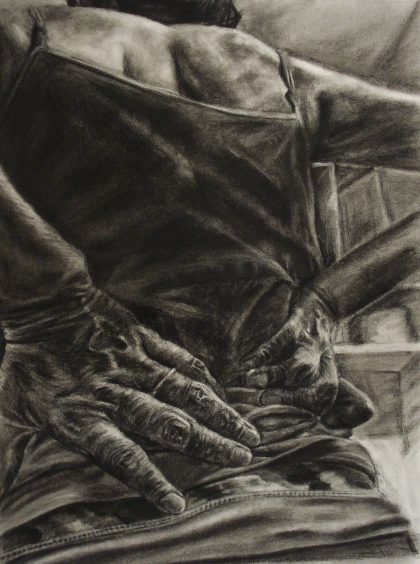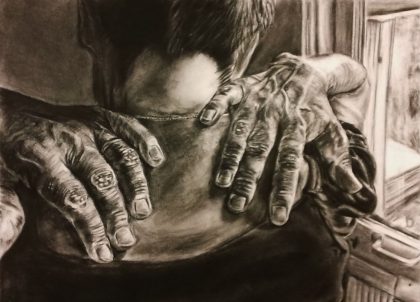
One of the recurring themes we saw in the entries to the 2015 Scholastic Art & Writing Awards was the struggle minorities face in the United States. From stories of police brutality to the plight of migrant workers, the students tackled these difficult subjects in their art and writing. Portfolio Gold Medalists Trace DePass and Aylen Mercado used the people around them, the neighborhoods they live in, and the harsh reality for many minorities in the United States as the inspiration for their portfolios. Their words and images shed light on aspects of American life that are often kept out of the news and sometimes thought of as problems that many believe don’t affect them directly. Trace and Aylen decided to confront these issues head-on, making powerful statements through their work.
Trace DePass is from Jamaica, NY, and attends Thomas A. Edison Career and Technical High School.
Trace’s portfolio, Black Boyhood, speaks about growing up black in a country where simply having darker skin can make others perceive you as a target and a threat. Trace knows how important it is for poets to speak out about what is happening around them. In an interview with Brooklyn Artistry, he states, “The ability to pen something into fruition is only part of a poet’s job description. Great poets live poetry. They do as much good as they can and then some.”
In his poem “Silence Contrapuntal,” Trace uses a form called contrapuntal in which the two or more columns of a poem can be read individually or as one piece.
“Silence Contrapuntal”

“Dear Bill De Blasio”
Dear Bill De Blasio,
You tell us to stop “resisting arrest.” Now, are you referring to the way we do 24/7, or do you just mean living when you say “resisting arrest?” I wonder if this is what you would tell Dante. A son, no matter if he owned a gun or had a reason for “suspicion” besides his pigment, a color we know all too well . . . too bad. Make sure to let your children know that this is the way it is, next time. Rear fear, if you’re morally sound with the idea that lives can end unfinished as ellipses, or like those “stolen” cigars . . . or that Arizona . . . or the last breath still pleading the fifth & for his life at the same time in a chokehold, somewhere . . . In America, a black boy is going unfinished. But, you say stop resisting arrest as if your compelled to say so, as if your hands were tied behind your back, like you were being held at gunpoint and had no choice, as if you were the one under arrest and weren’t even told why, as if you had the right to remain silent rather than accountable for a department for the city you govern, like politicians properly represent those that got them where they are, or something . . .
Like you were dying here with us,
the black community.
from “Brutality in Three Parts”
Twelve white men get around a table
Da Vinci paints them
We call it the last supper
Twelve black men get together
They sit & eat
Police tell them to keep it moving
Is nothing holy when we feast?
I guess our grace ain’t cutting it
This White Jesus
ain’t but nothing but a trigger finger on a crucifix.
But, they say “Nahh man . . you losin’ it”
Their god must not look like them
I wonder whose image they’re made in

Aylen Mercado is from Memphis, TN, and attends White Station High School.
In her portfolio After an Eight Day Work Week, Aylen explores “the struggles of the everyday worker who must sacrifice their body physically and mentally in hours of labor in order to survive.”
“My work reveals the end-of-the-day pain that a laborer experiences,” Aylen said. “Though I never explicitly cite the profession or work of the individual, I hope that people can connect with the pain that this worker and many others have to endure. Most pieces focus on the hands, feet, and head of the subject which are parts of the body that handle the most pain and stress from hours of laborious work. Much of my work emphasizes lines and wrinkles in the face and hands, and I believe that viewers will see this and subconsciously mimic these expressions as they analyze my work.”

